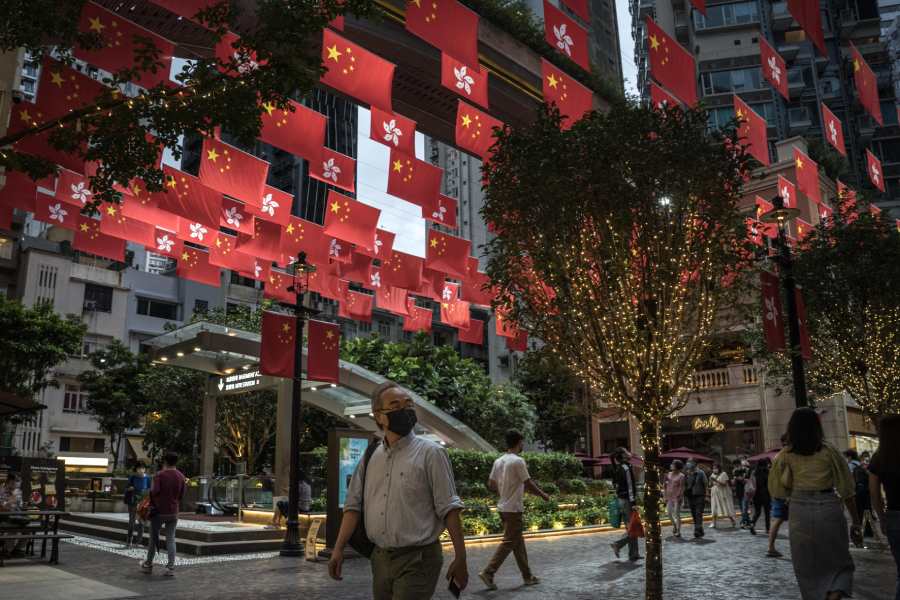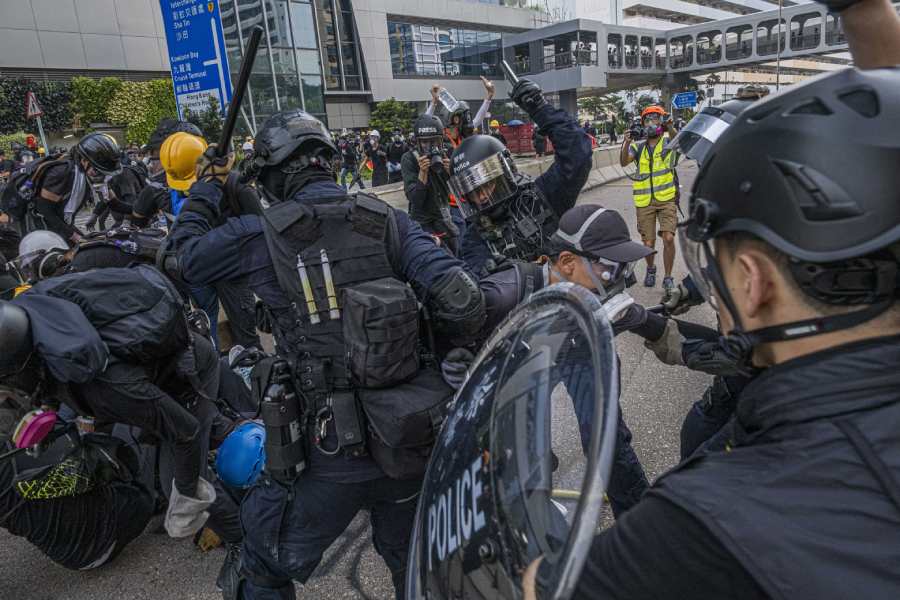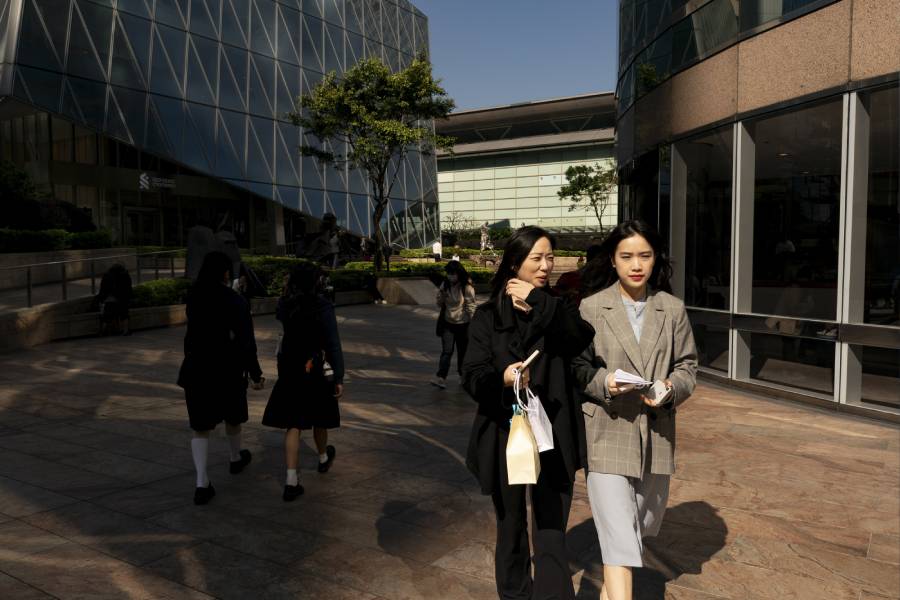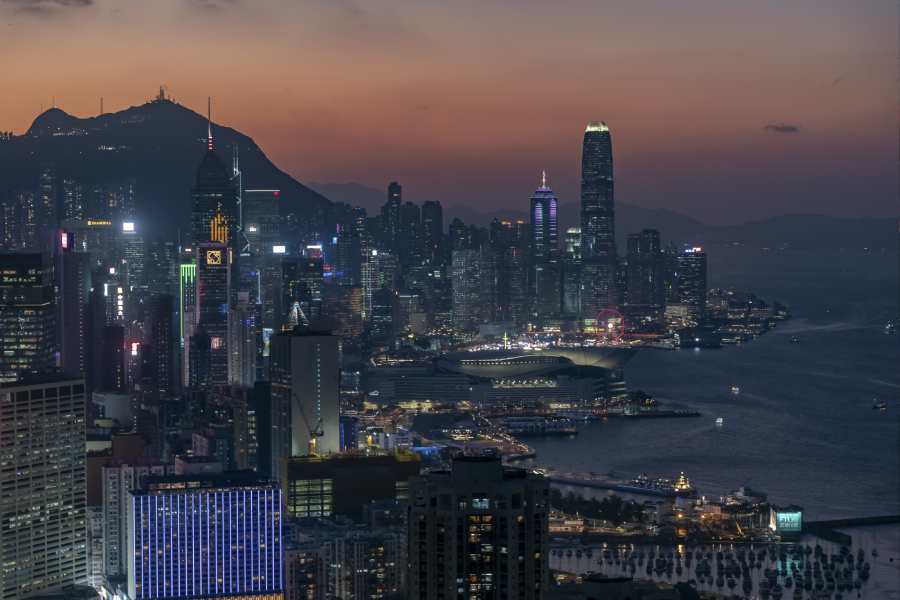Once one of Asia’s most high-flying cities, Hong Kong is now grappling with a deep pessimism.
The stock market is in the tank, home values have tumbled and emigration is fueling a brain drain. Some of the hottest restaurants, spas and shopping malls that local residents are flocking to are across the border, in the mainland Chinese city of Shenzhen.
“It pains me to say Hong Kong is over,” Stephen Roach, an economist and a former chair of Morgan Stanley Asia long known for his optimism about the city, wrote in a recent commentary in The Financial Times.

FILE — People walk under flags of China and the Hong Kong Special Administrative Region, on Queen’s Road in Honk Kong on June 18, 2022. National security legislation passed on March 19, 2024 gives officials in Hong Kong more power to curb dissent, 21 years after mass protests forced the government to backtrack on a plan to introduce such laws. Sergey Ponomarev/The New York Times
The government needs to revive Hong Kong’s economy and promote its global image, but it has instead largely focused on national security. It moved with unusual speed Tuesday to pass a package of updated and new security laws aimed at curbing foreign influence and dissent with penalties such as life imprisonment for treason and other political crimes. The legislation could deter even more foreign businesses, already a shrinking presence, from investing in Hong Kong.
The malaise hanging over Hong Kong is partly a consequence of its status as a bridge between China and the West, with the city’s growth dragged down by the mainland’s sputtering economy and China’s tensions with the United States.
But at the heart of Hong Kong’s troubles is a crisis of identity, as the city’s Beijing-backed officials push the once freewheeling city away from the West and embrace the top-down political culture and nationalistic fervor of President Xi Jinping’s China.
“People are very unhappy for all kinds of reasons,” said Emily Lau, a veteran pro-democracy politician and former lawmaker who now hosts an interview show on YouTube. “Of course, the authorities will not admit it publicly, but I think they know it.”

FILE — Protesters clash with police in the Kowloon Bay area of Hong Kong, Aug. 24, 2019. As leaders try to curb foreign influence in Hong Kong, its status as a global city with a free flow of information is in question. Lam Yik Fei/The New York Times
Hong Kong, a former British colony, had been promised a degree of autonomy from Beijing after it returned to Chinese rule in 1997, with freedoms unseen in the mainland. But after massive antigovernment demonstrations engulfed the city for months in 2019, Beijing imposed a sweeping national security law on Hong Kong in 2020 that the authorities used to crush the pro-democracy opposition with ferocity.
In the Chinese Communist Party’s telling, the protests were fueled by Western forces seeking to undermine Chinese sovereignty. John Lee, the city’s Beijing-backed leader and a former police officer, casts Hong Kong as a city still besieged by subversive foreign forces.
Lee says the new security laws will eliminate such threats and be “the strongest foundation for Hong Kong’s prosperity and stability.”
Lee and Chinese officials have argued that such laws are long overdue. The Basic Law, the city’s mini constitution, calls for Hong Kong to retain its own political and economic system for 50 years, but also requires it, under Article 23, to pass its own internal security laws. The government first tried to enact Article 23 laws in 2003 but backed down after hundreds of thousands of residents took to the streets in protest, fearing the legislation would limit civil liberties.
With the security laws in place, officials now say, the government can focus on other needs, like reviving the economy.

Office workers at Exchange Square in central Hong Kong, a major financial district, Jan. 15, 2024. The city's stock market has lost nearly half its value in three years. Anthony Kwan/The New York Times
But it is unclear if Hong Kong can retain the dynamism and vitality that drove its prosperity at a time when Beijing’s control is so overt. The new rules also raise questions about how the boundaries have shifted.
“Xi Jinping knows Article 23 will damage Hong Kong’s reputation as a financial center,” said Willy Lam, an analyst of Chinese politics at the Jamestown Foundation in Washington. “He knows Beijing needs Hong Kong for foreign investment, foreign exchange and stock market listings. But he is a totally ideological leader. It is far more important to him that he demonstrate his power, flex his muscles and emasculate all opposition in Hong Kong.”
City officials now routinely lash out at foreign governments, diplomats and the news media for any criticism of Hong Kong’s policies. Even voices from within the Hong Kong establishment are not spared the scoldings.
When a pro-Beijing lawmaker complained that police officers were issuing too many fines, Lee rebuked him for what he called an act of “soft resistance.”
The authorities have used this term to describe an insidious, passive defiance against the government. According to Lee, that defiance includes complaints that Hong Kong is too focused on national security.
The Article 23 legislation is meant to root out such “soft resistance,” officials have said, as well as fill in gaps left by the national security law that China directly imposed. The laws center on five areas: treason, insurrection, sabotage, external interference and the theft of state secrets and espionage.
Legal experts and trade groups said the laws’ broad and often vague wording created potential risks for businesses operating in or looking to invest in Hong Kong. The government had to scramble this month to deny reports that it was considering banning Facebook and YouTube as part of the legislation.
“An unfettered flow of information is crucial for the city to maintain its status as Asia’s financial center,” Wang Xiangwei, an associate professor of journalism at Hong Kong Baptist University, wrote in an editorial published Monday in The South China Morning Post, where he once served as chief editor.
The uncertainty has led some foreign firms to begin treating Hong Kong as if it were the mainland. They have begun using burner phones and limiting local employees’ access to their companies’ global databases.
Mark Lee, a Hong Kong native, said that the more his city looked and felt like the mainland, the more tempted he was to emigrate overseas.
The 36-year-old personal trainer said that in the last few years, about a quarter of the 200 people who used to belong to his WhatsApp group for organizing group runs and workout sessions had left Hong Kong. He is reluctant to have a child because he is worried about Hong Kong’s public school system, where national security education is required.
“When Hong Kong is not my city anymore, I will have to leave,” Lee said. The changes, he added, felt like “death by a thousand cuts.”
The New York Times News Service











